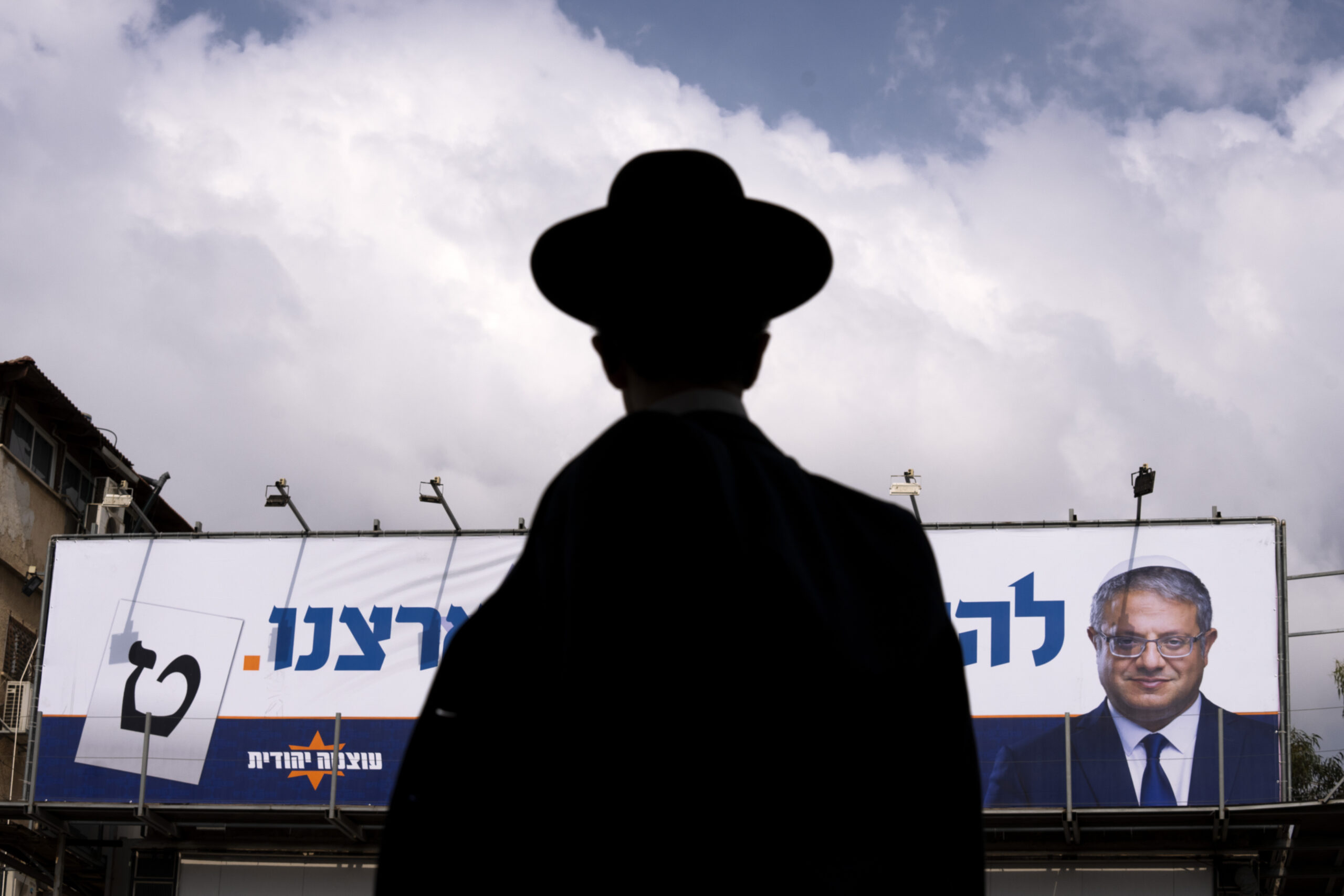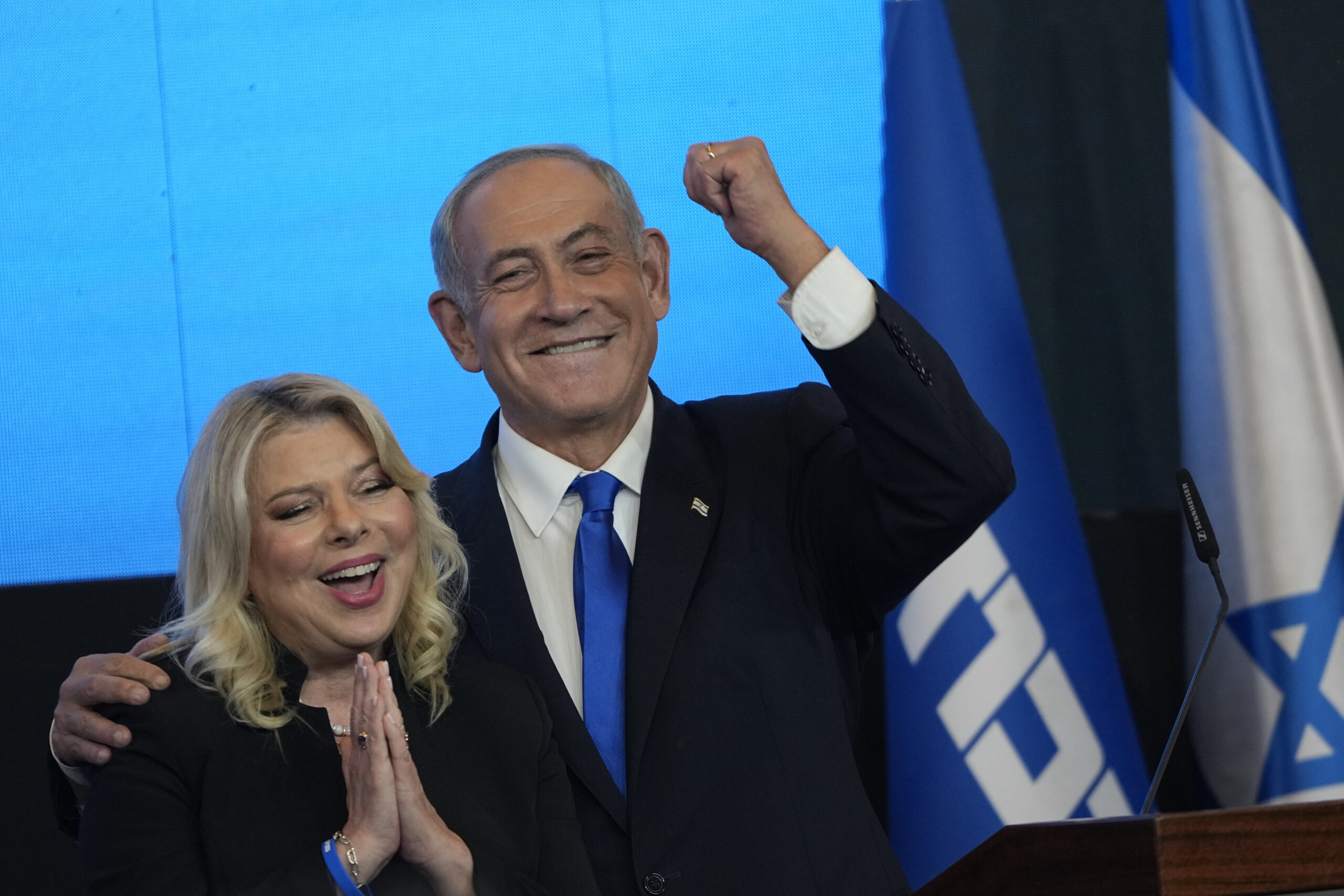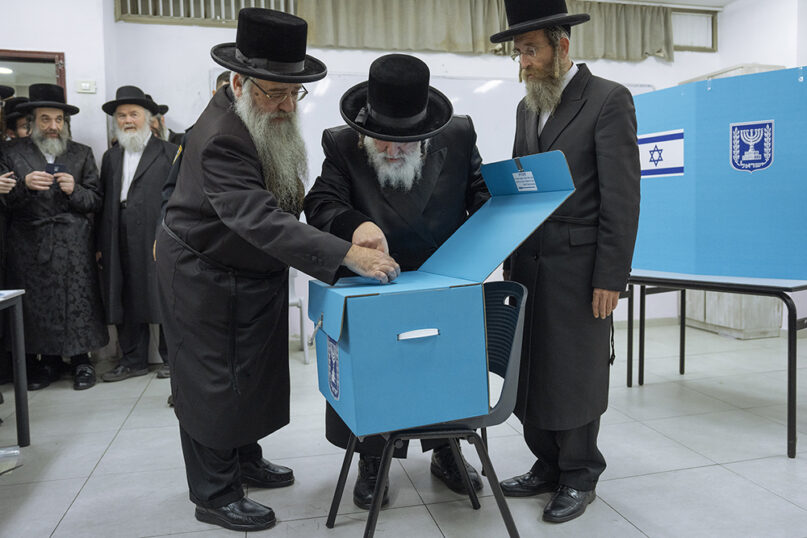(RNS) — Alarm bells have been clanging loudly in the White House and among some American Jews in the wake of the recent Israeli election, which virtually assured former Prime Minister Benjamin Netanyahu’s return to office, after a hiatus of more than a year. The prime fuel of this trepidation is the fact that Netanyahu’s victory was made possible by the Religious Zionism Party, headed by two nationalist firebrands, Bezalel Smotrich and Itamar Ben-Gvir.
Ben-Gvir in particular has a reputation for Arab-baiting, causing U.S. Secretary of State Antony Blinken and national security adviser Jake Sullivan, according to Axios, to hint to Israeli President Isaac Hertzog that the U.S. will refuse to work with Ben-Gvir.
Ben-Gvir, who was found guilty by an Israeli court of incitement in 2007 for carrying signs that read things like, “Expel the Arab enemy,” insists his animus isn’t aimed at Arab citizens of good will but only at people who seek to harm other citizens or betray the country.
Shortly before the election, he told The New York Times that he had “no problem, of course, with the minorities here” — only with “whoever is a terrorist, whoever commits terror.” He has also sought to distance himself from Meir Kahane, the anti-Arab firebrand who was assassinated by an Egyptian terrorist in 1990 and whom Ben-Gvir once called his hero.
RELATED: Israel’s Haredi voters drift hard right in leadership vacuum
Whether Ben-Gvir will live up to his boogeyman reputation or prove to have evolved into a responsible, if zealous, statesman remains to be seen, but Ben-Gvir may not be entirely in control of how he and his party are perceived: “Religious Zionism” is also a movement, an amalgam of religion and politics, and those in Israel who identify with it are fiercely nationalistic, extol army service and are strongly supportive of “the settlements” — Jewish towns and enclaves in the contested West Bank — and promote the establishment of more of them.

An ultra-Orthodox Jewish man walks by an election campaign billboard showing Itamar Ben-Gvir, Israeli far-right lawmaker and the head of “Jewish Power” party, in Bnei Brak, Israel Monday, Oct. 24, 2022. (AP Photo/Oded Balilty)
Ben-Gvir’s presence in the new government is likely to add to a common misunderstanding outside Israel about the two Haredi parties — often called “ultra-Orthodox” — that have long been part of Netanyahu’s governing coalitions: Shas and United Torah Judaism. These two parties are ideologically opposed to Israeli nationalism, shun army service and are ambivalent about settlements.
The confusion isn’t limited to the unschooled public. In 2000, The New York Times characterized Yigal Amir, who had assassinated Prime Minister Yitzhak Rabin five years earlier, as “ultra-religious.” Amir was not by any measure Haredi, however, but rather a religious nationalist. His contemptible act of murder was motivated by politics, specifically, Rabin’s participation in the Oslo Accords, which promised, among other things, Israeli withdrawal from the West Bank.
Far from agreeing with malefactors such as Amir, Rabbi Elazar Menachem Man Shach, the late founder of one of the smaller Haredi parties that now comprise United Torah Judaism, strongly opposed the establishment of West Bank settlements and endorsed Rabin’s “land for peace” vision. His Sephardic counterpart, the late founder of the Shas party, Rabbi Ovadia Yosef, did not oppose the Oslo Accords and in 1992 joined the Rabin government.
The Haredi parties’ priorities are not territorial or nationalist; they are focused almost entirely on religious and economic issues — things like maintaining longstanding religious practices at Jewish holy places; preserving curbs on public transportation on the Jewish Sabbath and government stipends for full-time yeshiva students and religious institutions. Haredi leaders have forbidden their followers from ascending the Temple Mount, a provocation embraced by some Religious Zionists.
Traditionally, Israel’s religious parties have held that lives are more important than territory.
Certainly, there are Haredim who personally oppose negotiations with the Palestinians or the relinquishing of any territory captured by Israel in 1967. Because they ally with Netanyahu, who champions their religious agenda, the Haredi parties indirectly support the Likud government’s nationalist policies.

Former Israeli Prime Minister and the head of the Likud Party, Benjamin Netanyahu and his wife Sara gesture after first exit poll results for the Israeli Parliamentary election at his party’s headquarters in Jerusalem, Wednesday, Nov. 2, 2022. (AP Photo/Tsafrir Abayov)
More concerning for proponents of actively pursuing a peace process, some younger Haredim have been adopting Religious Zionism attitudes, promising continuing hostility between Arab and Jewish Israelis.
But established Haredi politicians have a record of reaching out to Arab Israeli citizens. In a Knesset speech a year ago, the United Torah Judaism party’s Moshe Gafni stressed the need for “weaker” parts of Israeli society — Haredim and Arabs — to band together. In the wake of a recent spike in Palestinian attacks in cities inside Israel, including the Haredi town of Bnei Brak, United Torah Judaism’s Yisrael Eichler reiterated that Israel’s Arab population are full citizens and need to be treated as such.
This past April, in fact, Bnei Brak decided to honor the memory of an Arab police officer, Amir Khoury, who was killed while apprehending a terrorist, by naming a street after him. Khoury’s father, Jeries, said that “a very strong connection has developed between us and the Haredi community in Bnei Brak, including rabbis and religious figures … They all came to the funeral and to console us.”
RELATED:
Israel’s new policy on ‘kosher cellphones’ is an abomination for Haredi rabbis
Politically and religiously liberal American Jews have cause to grumble over the outcome of the recent election. Issues such as religious standards at the Western Wall, the Israeli Rabbinate’s control over marriages and other life-cycle events and whether public transportation should respect the Jewish Sabbath will, under the new government, be approached from a Haredi viewpoint.
But when it comes to the issue of Jewish-Palestinian relations and the hope for an eventual resumption of a peace process, the vast majority of Haredim, even if their political parties end up joining a government that includes the likes of the Religious Zionism Party, do not drink at the well of harsh nationalism or racism and should be correctly understood as devoted to a religious ideal, not a political one.
(Rabbi Avi Shafran writes widely in Jewish and general media, is a columnist for Ami Magazine and serves as director of public affairs for Agudath Israel of America. The views expressed in this commentary do not necessarily reflect those of Religion News Service.)





